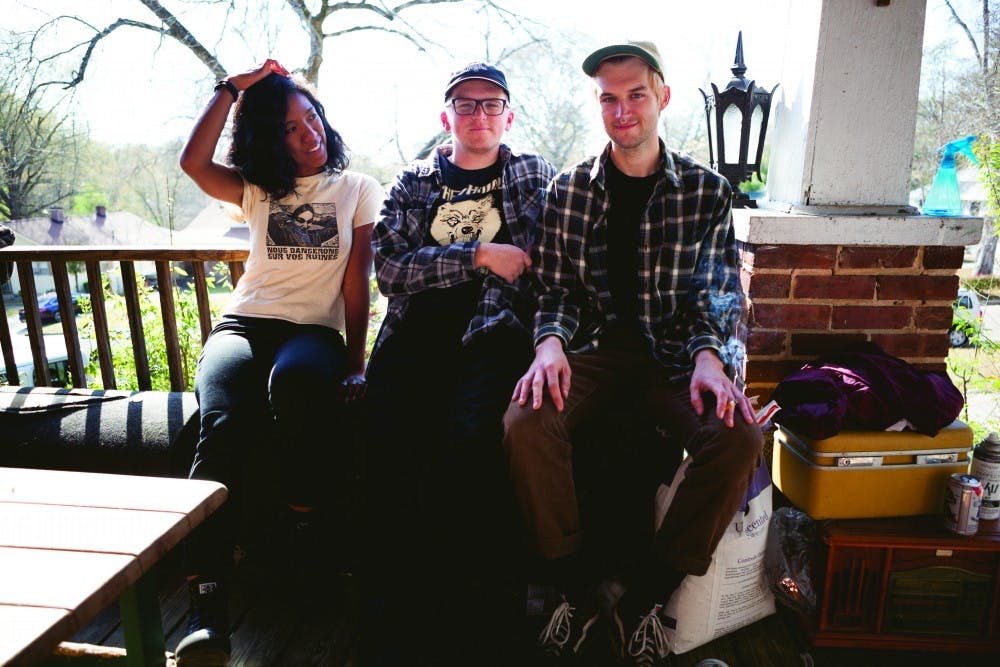SOMETIMES BAD LUCK ISN’T ALWAYS BAD. FK MT. BECAME WHAT IT IS TODAY AFTER RYAN MORRIS’ GEAR WAS STOLEN.
The first fk mt. (pronounced “f--- mountain”) release was actually a set of solo acoustic tracks by vocalist Morris. Even though it worked out well, the switch to electric wasn’t planned. After someone broke into his previous band’s shed and stole his drum set, he used the insurance money to buy an amp and electric guitar.
During the same summer, fk mt. became a three piece after Morris asked Ony Ratsimbaharison to join on bass and Brandon Johnson on drums, which is the same line up they have now, nearly four years later.
Though there are a few local bands they frequently share bills with, such as MyBrother MySister, they find themselves playing with out of town bands more often. They’re not heavy enough for most of Columbia’s metal lineups but too much for the alt-rock shows. That is what’s landed them in the niche of indie punk.
fk mt. has the innate energy of American punk without the aggressive urgency that’s often associated with the genre. They’re forceful but fuzzed out, like a stoner’s take on the lighter garage punk of today.
Morris says most of their songs discuss anxiety and depression and its effects on everyday life, and these emotions come through on every track, with lyrics such as “You probably hate my guts / I hate my guts too.” But just because their songs aren’t overtly political doesn’t mean the band isn’t vocal about the current political climate.
While performing in front of the Columbia Museum of Art several days after the 2016 presidential election, fk mt. dressed the stage with a “F--- TRUMP” sign. Like many musicians before them, they use their stage time as a platform to discuss social issues.
“I’m not opposed to writing political lyrics, but I like talking about politics on stage more,” Morris says. “I use that as my time to say something that I want to get off my chest that’s bothering me.”
If people are in the crowd watching, they’re listening, and they might agree with what you have to say. Music—all art—is a vehicle for change, even if just on a local level. There’s a unifying, almost comforting feeling of seeing people in the surrounding community fed up and striving for change together through the only ways they know how.
According to Ratsimbaharison, if there’s something that’s upsetting you, it’s important to put it out there. Whatever problem is on the forefront of their minds manages to make it into their music somehow, whether intentional or not.
“I don’t write the lyrics, but that stuff affects me all the time,” she says. “Even if people aren’t thinking about [social issues], if they like your music and see that this is what you’re actually writing about or thinking about, they’ll be interested in that too, hopefully.”
Ratsimbaharison is one of many local women in music that volunteers with Girls Rock Columbia, a non-profit camp that challenges gender stereotypes and builds self-esteem in girls through teaching them to play instruments.

Part of GRC’s goal is to encourage diversity and create more role models within the scene for a younger generation of musicians to come. “Not seeing yourself enough has a really big effect on you picking up an instrument,” Ratsimbaharison says, because it’s intimidating to start playing music when there’s no one to look up to.
The music industry hasn’t historically been a welcoming place for minorities, women or the LGBT community. There’s always more work to be done, but Columbia’s scene is more diverse than it was even a few years ago.
“More women, more people of color are saying, ‘hey, we’re here — we want to be involved too,’” she says. “The landscape is changing, so I think [Columbia’s music scene] has grown in a really good way.”
The growing inclusivity of scene like Columbia’s is thanks to people taking matters into their own hands and not waiting for venues to change their lineup patterns. Although they’ve played plenty of shows at small venues like New Brookland Tavern around the Southeast, their most common touring circuits involve setting up and playing in someone’s living room, or other non-traditional spots, like Blue Tile Skateboards in Five Points.
The DIY scene is home base for fk mt., figuratively and literally — Morris and Ratsimbaharison are two of the residents at one of Columbia’s most trafficked house-show houses, Queen Punx Palace.
While different people book shows at Queen Punx regularly, when fk mt. books shows, they try to bring in similar sounding bands from different cities to match their sound while also exposing a scene that might have gone unnoticed.
They actually credit a lot of their growth to the groups they’ve met and worked with from around the Southeast. Their sound doesn’t fit precisely into how many venues stack lineups, so they’ve taken booking and touring into their own hands like so many DIY bands have done before them. House show culture is the backbone for punk communities everywhere, not just in Columbia.
“When we tour, we meet people and tell them we’re from South Carolina and they’re like, ‘I never even thought to go there,’” Ratsimbaharison says.
“Then they’ll come, and they’ll come again…The more people go out there and travel and tell people about Columbia, the more it grows.”



